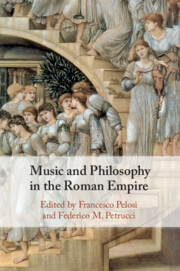Book contents
- Music and Philosophy in the Roman Empire
- Music and Philosophy in the Roman Empire
- Copyright page
- Contents
- Notes on Contributors
- Acknowledgements
- Abbreviations
- Introduction
- Chapter 1 The Scala Naturae and Music
- Chapter 2 Music and Plutarch’s Platonic Cosmos
- Chapter 3 The Harmoniser God
- Chapter 4 Alexander of Aphrodisias and Musical Models for Ontological Enquiries
- Chapter 5 How to Resist Musical Dogmatism
- Chapter 6 Shifting Epistemological Perspectives in Ptolemy’s Harmonics
- Chapter 7 Musical Imagery in Clement of Alexandria and Origen
- Chapter 8 Plotinus on Music, Rhythm, and Harmony
- Chapter 9 Porphyry’s Commentary on Ptolemy’s Harmonics
- Chapter 10 The Music of the Virtues in Late Ancient Platonism
- Chapter 11 Harmonics as Theological Paradigm in Proclus
- Chapter 12 Calcidius on Cosmic Harmony
- Chapter 13 Harmonia in Philoponus’ Commentary on Nicomachus’ Introduction to Arithmetic
- Bibliography
- Index Locorum
- General Index
Chapter 12 - Calcidius on Cosmic Harmony
Published online by Cambridge University Press: 27 November 2020
- Music and Philosophy in the Roman Empire
- Music and Philosophy in the Roman Empire
- Copyright page
- Contents
- Notes on Contributors
- Acknowledgements
- Abbreviations
- Introduction
- Chapter 1 The Scala Naturae and Music
- Chapter 2 Music and Plutarch’s Platonic Cosmos
- Chapter 3 The Harmoniser God
- Chapter 4 Alexander of Aphrodisias and Musical Models for Ontological Enquiries
- Chapter 5 How to Resist Musical Dogmatism
- Chapter 6 Shifting Epistemological Perspectives in Ptolemy’s Harmonics
- Chapter 7 Musical Imagery in Clement of Alexandria and Origen
- Chapter 8 Plotinus on Music, Rhythm, and Harmony
- Chapter 9 Porphyry’s Commentary on Ptolemy’s Harmonics
- Chapter 10 The Music of the Virtues in Late Ancient Platonism
- Chapter 11 Harmonics as Theological Paradigm in Proclus
- Chapter 12 Calcidius on Cosmic Harmony
- Chapter 13 Harmonia in Philoponus’ Commentary on Nicomachus’ Introduction to Arithmetic
- Bibliography
- Index Locorum
- General Index
Summary
In his Commentary on Plato’s Timaeus, the fourth-century exegete Calcidius makes ample use of musical theory and its kinship with the related sciences arithmetic, geometry and astronomy. Musical theory impacts upon the metaphysical, physical and ethical aspects in his account of the composition of the cosmic soul. Calcidius draws upon the soul’s musical make-up to show how it translates into the arrangement of the heavenly bodies, the relationships between the immortal and mortal creatures in the cosmos, and the tripartite human soul. Emphasizing the overall significance of harmonics for his exegesis, Calcidius, in fact, likens the creator god to a musician who composed the All as a well-tuned symphony. I shall discuss these aspects of his exegesis by placing them, initially, into the context of his sources, thereafter focusing on more idiosyncratic aspects: Calcidius’ referencing of musical composition for the question of the soul’s (un-)createdness, the relationship he establishes between harmonics and his demonology, and his view on human psychological conditions such as anger and passion. These conditions, according to Calcidius, are not merely a consequence of the human soul’s association with the body, but psychological manifestations of its natural make-up, which is determined by numeric-musical proportions.
- Type
- Chapter
- Information
- Music and Philosophy in the Roman Empire , pp. 262 - 285Publisher: Cambridge University PressPrint publication year: 2020

